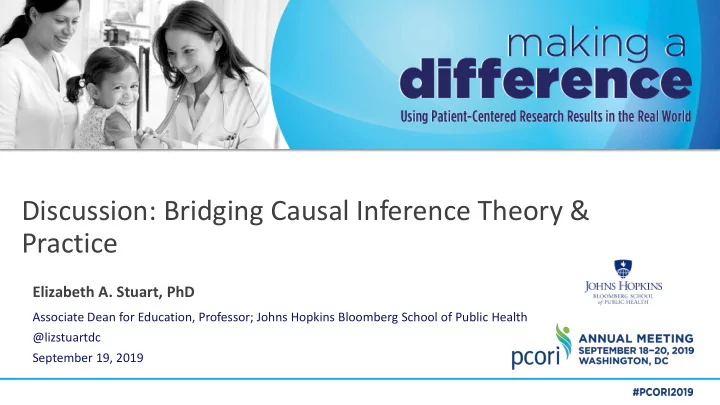

Discussion: Bridging Causal Inference Theory & Practice Elizabeth A. Stuart, PhD Associate Dean for Education, Professor; Johns Hopkins Bloomberg School of Public Health @lizstuartdc September 19, 2019
Elizabeth Stuart Disclosures Rela latio ionship ip Company ny(ies es) Speakers Bureau Advisory Committee Board Membership Consultancy Review Panel PCORI Funding ME-1502-27794 (co-PI Dahabreh; completed) Former Chair of Clinical Trials Advisory Panel Honorarium Ownership Interests Stock holdings in Abbott Labs, Abbvie, Chemtura, Express Scripts, Johnson & Johnson, Medtronic, Merck, Proctor & Gamble, Phillips, Quest Diagnostics 2
Causal inference overview 3
We see only one potential outcome for each unit 4
Defining Causal Effects • A causal effect is a comparison of potential outcomes for the same units • e.g., for Joe, what would happen if today he does or doesn’t take an antidepressant • e.g., for a group of patients, the average difference in mortality if they all receive Drug A vs. Drug B • Causal effects are not comparisons of outcomes for different groups of people • But we can use those people to estimate causal effects! 5
So how do we estimate causal effects? • Randomized experiments give us unbiased estimates of effects • Treatment group provides good estimate of what would happen to full sample under treatment; same for control group • But we often can’t randomize • Ethics • Concerns about generalizability • Instead use non-experimental studies • The catch is that non-experimental studies will always involve some assumptions about the unobserved potential outcomes 6
The three talks • There is a long history of rigorous methodological work examining how to estimate causal effects in non-experimental settings • But still MANY questions about complications that come up in practice • These 3 talks aim to bridge this gap and develop methods for the questions that come up in clinical practice • Dr. Neugebauer: How to study dynamic treatment regimes, where treatment decisions depend on (evolving) response to earlier treatments? • Dr. Gutman: How to compare outcomes across a set of treatment choices (more than two)? • Dr. Zeger: How can we help predict what is best for each individual? 7
Dr. Neugebauer: The main idea • Many treatment decisions depend on a current health status, which may be a function of earlier treatment decisions • Possible, but hard, to study in randomized designs (would need large samples, long time period, etc.) • Can we take advantage of large-scale EHR data to estimate the effects of dynamic regimes? • Yes! With careful attention to time ordering, confounding, and challenges that arise from infrequent/unspecified timing of monitoring in EHR 8
Dr. Neugebauer: Questions/Thoughts • Challenges in defining the potential adaptive intervention • Importance of diagnostics • Especially in terms of data support (was happy to see that) • How can we understand: 1) how many people actually experience the adaptive regimes of interest, and 2) how similar/different they are from one another? • These diagnostics relatively straightforward in simple two group/two time point case; how to make it easy here? 9
Dr. Gutman: The main idea • Most causal inference methods developed for two treatment conditions, but many clinical questions involve choice of a few options • May be hard to do a randomized trial with enough subjects • So instead take advantage of large-scale non-experimental data • The catch is that causal inference becomes even harder • Instead of only seeing ½ of the potential outcomes we see 1/3, or ¼, or 1/5 • It even becomes hard to define the target estimand! • Reference population • Comparison conditions • Matching and imputation approaches to estimate the effects 10
Dr. Gutman: Questions/Thoughts • Really nice to see a thoughtful discussion of these issues, including the challenges induced by different eligibility • Also nice example of replicating a randomized trial as much as possible in terms of defining exposures, outcomes, timing, etc. • Builds on long tradition (Rubin, Cochran), now “trial emulation” (Hernan) • And does a sensitivity analysis to unobserved confounding • Data requirements are large, especially with more and more treatment groups • How to develop the right diagnostics, tied to the estimands, and that show whether data are sufficient for comparisons 11
Dr. Zeger: The main idea • We want to figure out “what works for whom” by borrowing information on “similar” individuals who came before • Define subsets of individuals who are similar to one another, to then learn and predict for future “similar” individuals • Use Bayesian methods to combine population level data with expert judgement • The ultimate goal: Implement this in a learning healthcare system 12
Dr. Zeger: Questions/Thoughts • Great goal: helping clinical decision making for each patient rely on previous knowledge (both in the data and expert opinion) • But this is hard! Remember point about individual causal effects • How to define similar? Background characteristics? Prognosis without treatment? • How to deal with confounding when considering different treatment choices? • How to reflect uncertainty? 13
Common themes • With more complex questions come more data needs • Need for thoughtful data collection in non-experimental studies • Common assumption of unconfounded treatment assignment • How can we make better use of data or qualitative methods to understand plausibility of this assumption? • Sensitivity analyses crucial • Will always be untestable assumptions in non-experimental settings • Question is how to make those more plausible, or how to assess robustness of results to violation of them 14
Common themes (cont.) • Very impressive work from all three presenters • Answering important clinical questions with rigorous and innovative methods THANK YOU! 15
Learn More • https://www.elizabethstuart.org/ • https://www.pcori.org/research-results/about-our- research/research-methodology/methodology-standards- academic-curriculum • inc. module on causal inference by me and Dr. Zeger! 16
Thank You! Elizabeth A. Stuart Associate Dean for Education, Professor @lizstuartdc September 19, 2019 17
Questions? 18
Recommend
More recommend